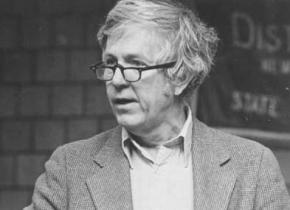What Harrington shows us
, author of Vietnam: The (Last) War the U.S. Lost, considers the politics of the best-known proponent of democratic socialism in the U.S.
BHASKAR SUNKARA, the founding editor of the new and widely read Jacobin magazine, has written an article for In These Times titled "Lean Socialist," which argues that socialists need to find their "way back to political relevance...through realistic engagement with politics as it exists today."
Sunkara concludes the article with the statement: "[T]hat involves messiness and compromise--reaching out to liberals as friends and allies--while not losing sight of the need to decisively transform a political framework built on a self-destructive and morally intolerable mode of production."
There's no disputing that "engagement" is good. But it can also mean many things.
Sunkara holds up Michael Harrington as someone who was at least willing to engage with liberalism, even if Sunkara has criticisms about how he did it. There is a lot to be said about Sunkara's assertions throughout the article, but I'd like to focus on this particular influence.
I know Harrington's politics rather well since he was the first socialist I read as a high school student in Stoughton, Mass., in the mid-1970s. My old sociology teacher, Jim Gormley, had many books in the back of his classroom for extra reading, including Harrington's famous The Other America, and another book that was a collection of Socialist Party speeches and party platforms.

For a 16 year old in a small Massachusetts town, this was pretty exciting stuff. I credit Jim Gormley and Michael Harrington with opening up my eyes to the injustices of the wider world. Later, I read Harrington's Fragments of the Century--his take on the struggles of the 1960s--and The Twilight of Capitalism, his argument for an expanded welfare state in the late 1970s.
I was a "Harringtonite" when I started college in 1978 at UMass-Boston. But Harrington's "radicalism" began to wear off as I learned more about his own political history--and as I began to engage with Marxists in groups like the International Socialist Organization.
Harrington's role in trying to stifle the early New Left of the 1960s--specifically, by red-baiting the newly formed Students for a Democratic Society for not being militantly anti-Communist in its founding document, The Port Huron Statement--was an eye-opener. Another was Harrington's support for the Vietnam War, long after even capitalist institutions like the New York Times came out against it. I found the latter particularly shocking.
I soon learned that these politics were more than just personal failings, but represented one of the great divisions on the left during the Cold War, with social democrats like Harrington supporting U.S. imperialism in its rivalry with Stalinist Russia. That's why there's the appendage of "democratic" to the socialist label in Harrington's political affiliation, as a distinction from those who supported Russia or later China against the U.S.
Rather than side with one power or the other, people in the ISO tradition stood for "Neither Washington nor Moscow, but Workers' Power, East and West"--which to me was more refreshing and exciting. It was similar to the slogan that originated with Max Shachtman during the Second World War, before he ultimately sided with the U.S. in the early 1960s.
Once I learned all of this--and in the face of the disappointments of Democrat Jimmy Carter's presidency that paved the way for Reaganism a few years later--I broke with Harrington world-view and the idea that left-wing activists should support the Democratic Party.
IN THE early 1980s, I had a small encounter with Harrington in Boston, while he was on a speaking tour for the Democratic Socialist Organizing Committee (DSOC), the precursor to the Democratic Socialists of America (DSA). He was speaking on Ronald Reagan's reactionary foreign and domestic policies. We were beginning to live through the storm of union-busting following Reagan's destruction of the air traffic controllers' union PATCO and other crimes of the era.
Much of Harrington's talk was unobjectionable, but something was missing. President Reagan could only get away with busting PATCO--using a contingency plan drawn up by the Carter administration, incidentally--because of the lack of solidarity from other unions, the most important of which was the International Association of Machinists, which represented mechanics and baggage handlers at most airlines.
The IAM was led by William Winpisinger, known to many union activists as "Wimpy"--who was also a member of Harrington's DSOC. If IAM members had honored PATCO's picket lines, Reagan would have had to back off the drive to break the air traffic controllers union completely. PATCO could have even won the strike. Yet Winpisinger ordered his members to cross the picket lines, ensuring PATCO's defeat.
So I raised my hand nervously--with my old buddy Kevin Murphy prodding me to do so, with his forefinger poking me in the back--and asked Harrington about this. A flash of recognition came across his face--as if to say, "Oh, there's a Trot in the room." He began to answer me in a very roundabout way, not really taking up the real issue, until he got to his punch line: "There are no answers to impossible questions."
I was extremely disappointed by this. Here was an important moment in the class struggle where Harrington, Winpisinger and others had real influence in the labor movement. They could have made a decision that really could have changed history and our lives for the better. Instead, they caved.
Harrington's books should be read and debated in the context of the challenges facing socialists today. But I would also argue to this new generation of activists: "Don't be like Mike."


